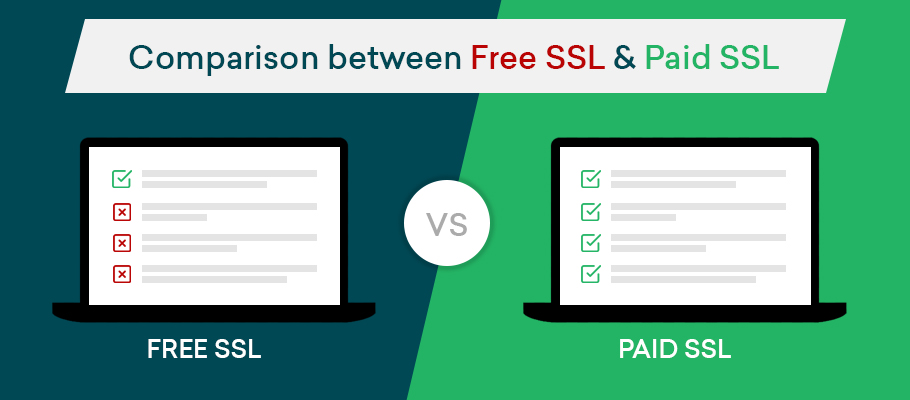As hacking technology is evolving rapidly, and thousands of internet users are being targeted by it, data safety on e-commerce websites is always on the top priority for web owners. Thus, SSL certificates are widely used on websites for data security. Moreover, the most used search engine like Google is also encouraging web owners to install an SSL certificate for getting maximum web security and SEO benefits.
SSL stands for Secure Sockets Layer; it is a security protocol that is used to encrypt the data transmission between a server and a browser. This encryption ensures users on the website that data is protected from cybercriminals. So, for any online business website you have, you must defend your website with an SSL certificate.
There are different types of SSL certificates, but mainly two categories are commonly known, it’s free and paid. Both these categories provide data encryption, but a free SSL certificate comes with some limited features whereas paid SSL certificate comes with almost all features that fulfill website security requirements. Let’s compare both these SSL certificates in detail and choose the one which is most suitable for your website.
Free SSL and a Paid SSL Certificate Know the Differences
#1. Validation Levels
SSL certificate come in three different types which are different from each other in level of validation. Those three types are:
The Domain Validation (DV) certificate usually comes in the free category, and it is best suitable for smaller and more personal sites like blogs. On the other hand, all three DV, OV and EV certificates come in paid categories that are meant for more giant corporations like Banks, Financial institutions and big e-commerce such as Amazon, Snapdeal and many more that often need a higher level of validation.
#2. Support
Free Certificate issuing authorities usually do not provide installation support with a free certificate. On the other hand, paid certificates offer direct technical support with troubleshooting assistance if there if something goes wrong with the installation.
#3. Warranty
The free certificate provides no warranty if anything goes wrong due to the flaws in the authentication process. But Premium certificates provide a warranty and this warranty is like business insurance which provides compensation against any damage to the business resulting from mis issuance of a certificate. The different certificate provides different warranty; they may range from $5000 to $1 Million.
#4. Price
A free certificate typically provides encryption free of charge for DV SSL only, but the price range is different with each paid type & brand such as Comodo, RapidSSL, GeoTrust, Thawte and DigiCert. At ClickSSL, for Domain Validation (DV) certificates price starts from $10, for the Organization Validation (OV) certificates start from $57.13, and for Extended Validation (EV) certificates start from $60.
#5. Server Compatibility
All paid certificates are compatible with most popular servers like Apache, MS Exchange, cPanel etc. Whether it is a self-managed or dedicated server. Although a free SSL certificate has less compatibility, sometimes it is limited to a few servers.
#6. Level of Trust
Paid SSL certificates show trust signals to the web customers such as a green lock sign, https:// in the URL, green bar for a business name, business name in certificate details, site seals etc. These trust signals build customer trust and help to make users feel safe on such websites for sharing their private information or doing financial transactions. On the contrary, the free SSL certificate provides only ‘https://’ & green padlock sign in the browser because it comes with only DV certificate features (excluding site seal feature) but does not come with OV & EV certificate features. Therefore, many users of such websites are willing to see other trust signs too while dealing with websites for their data exchange, then at that time, the lack of user’s trust may affect the business reputation as well as business profitability.
#7. Lifetime
Free certificates are usually valid for 30 days or 3 months and they are just like a trial pack. Free certificate users must consider their renewals from time to time. However, the paid certificates are often valid for up to two years (as per the customer’s requirement for certificate validity year). So, users do not have to worry about the repetitive renewal process because they will get renewal reminder emails from paid certificate providers and it may happen that they will get additional benefits to renew SSL certificate before expiry.
Conclusion
Paid SSL certificate comes with several features as compared to a free one, but it does not mean that a free certificate is not used. If you are running a small website that does not require the highest validation, the free one is suitable for you. On the other hand, if financial transactions and private data transmission are being done on your website, then you must go for the paid one, as it will provide enough security with the highest validation according to website security requirements.

